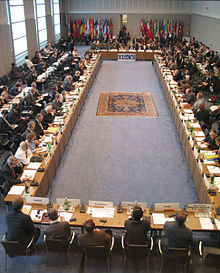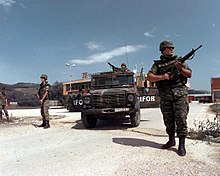Organization for Security and Co-operation in Europe
![]()
OSCE is a redirect to this article. For other meanings, see OSCE (disambiguation).
The Organization for Security and Co-operation in Europe (OSCE) is a permanent peacekeeping conference. On 1 January 1995 it emerged from the Conference on Security and Co-operation in Europe (CSCE), which had been founded on 1 August 1975 with the Helsinki Final Act. The OSCE consists of the following 57 participating States:
- all European countries (and Cyprus),
- Mongolia,
- the successor states of the Soviet Union
- as well as the USA and Canada.
· OSCE Headquarters Vienna
· 
Imperial Palace
·
Palais Pálffy
The seat of the General Secretariat and the most important bodies is Vienna, with the Hofburg and, since 2007, the Palais Pálffy on Wallnerstrasse (headquarters).
Targets
The goals of the OSCE are to secure peace and post-conflict reconstruction. It sees itself as a stabilizing factor in Europe. As a regional arrangement under Chapter VIII of the United Nations Charter, the OSCE is to serve as the first international interlocutor in conflicts within its sphere of influence, in accordance with the principle of subsidiarity. It is regarded as a system of collective security and is thus definitely in competition with NATO, which, however, is clearly more militarily oriented. In accordance with the "OSCE first" principle, it also co-operates with international organizations. Due to the inconclusive summit meeting in 2010, the question of the OSCE's future goals remained open.
The activities of the OSCE are divided into three thematic areas ("dimensions"), which go back to the three baskets of the Helsinki Final Act. These are (a) the Politico-Military Dimension, (b) the Economic and Environmental Dimension, and (c) the Humanitarian (Human Rights) Dimension.
Committees and organs
- Presidency-in-Office (together with the previous and following Presidencies, the Troika), assisted by the Secretary-General
- Summit of Heads of State and Government (decision-making; meets irregularly, most recently in 2010)
- Ministerial Council (annual meeting)
- Permanent Council (Vienna, at least one weekly meeting) and committees of the three dimensions.
- Parliamentary Assembly
- Forum for Security Co-operation (can take decisions in the military-political field, meets weekly)
- OSCE Missions and Field Operations
- Office on Democratic Institutions and Human Rights (ODIHR)
- High Commissioner on National Minorities
- Representative on Freedom of the Media (RFOM)
General Secretaries
The Secretaries General of the OSCE:
- 1993-1996 Wilhelm Höynck (Germany)
- 1996-1999 Giancarlo Aragona (Italy)
- 1999-2005 Ján Kubiš (Slovakia)
- 2005-2011 Marc Perrin de Brichambaut (France)
- 2011-2017 Lamberto Zannier (Italy)
- 2017-2020 Thomas Greminger (Switzerland)
- since 2021 Helga Schmid (Germany)
The Secretary General of the OSCE shall have the following functions:
Political
- Acts as deputy to the Chairman and assists him in all activities designed to achieve the objectives of the OSCE
- Participates in the meetings of the OSCE Troika (previous, current and next Chairperson)
- Supports the process of political dialogue and negotiation among participating States
- Maintains close contacts with all OSCE delegations
- Establishes, in consultation with the Chairperson, an early warning system for the Permanent Council in the event of emerging tensions or conflicts in the OSCE area and, after consultation with the Member States concerned, proposes timely and effective measures to address them
- May submit to the decision-making bodies, in consultation with the Chairperson, any matter relating to his or her mandate
- Participates actively in the debates of the Permanent Council and the Forum for Security Co-operation
Administrative
- Is the Administrative Manager of the OSCE and Head of the OSCE Secretariat
- Ensures the implementation of the decisions of the OSCE
- Submits the programme of activities and the overall budget to the Permanent Council
- Oversees the OSCE's activities in the field and co-ordinates its operational work
- Ensures programme coordination between the Secretariat, the institutions and the activities in the field as well as within these activities.
- Acts as a focal point for co-ordination and consultation among OSCE institutions and holds regular co-ordination meetings with their heads to achieve synergies and avoid duplication
Office for Democratic Institutions and Human Rights
The Office for Democratic Institutions and Human Rights (ODIHR) in Warsaw is the "main institution of the Human Dimension" (Basket III) of the OSCE. Originally, the Office for Free Elections (an institution for international election observation) was the Human Dimension component of the institutional package to be negotiated at the 1990 CSCE Paris Summit.
Its first task was to monitor the elections in the former Eastern Bloc countries of Central and Eastern Europe and in the Central Asian republics of the former Soviet Union. The Helsinki Document of 1992 further strengthened the ODIHR, Norway had the concept of democratization and human rights included in the title of the institution.
Subsequently, the ODIHR organizes an implementation meeting in Warsaw every two years to monitor compliance with OSCE Basket III commitments, with the participation of OSCE participating States as well as other intergovernmental organizations and non-governmental organizations. It also organizes seminars, supports OSCE missions and democratic structure-building through a variety of other activities, collects and makes available information, and publishes guidance. Furthermore, election observation makes up a large part of its activities.
Directors
- 1991-1994: Luchino Cortese (Italy)
- 1994-1997: Audrey Glover (UK)
- 1997-2002: Gerard Stoudmann (Switzerland)
- 2003-2008: Christian Strohal (Austria)
- 2008-2014: Janez Lenarčič (Slovenia)
- 2014-2017: Michael Georg Link (Germany)
- 2017-2020: Ingibjörg Sólrún Gísladóttir (Iceland)
Economic and environmental dimension
The economic and environmental dimension goes back to the "second basket" of Helsinki (cooperation in the fields of technology, science, economy and environment). In the economic and environmental dimension, the Organization is concerned, among other things, with combating corruption, money laundering, the financing of terrorism, organized crime, and cybercrime. The OSCE also promotes co-operation in the fields of the environment, water management, migration issues and energy.
High Commissioner on National Minorities
The post of High Commissioner on National Minorities (HCNM) was created at the 1992 Helsinki Summit. The HCNM's office is located in The Hague and employs about 10 people.
This office of quiet diplomacy was shaped since 1992 by the Dutchman Max van der Stoel, who was succeeded in 2001 by the Swede Rolf Ekéus. From 2007 to 2013, the former Norwegian Foreign Minister Knut Vollebaek held the office of HCNM. On 20 August 2013, former Member of the European Parliament and Finnish Minister for Migration and European Affairs Astrid Thors began her term as HCNM. Since 19 July 2017, Italian diplomat Lamberto Zannier has been in office.
The Office is supposed to identify and resolve tensions that could endanger peace, stability or good relations among OSCE participating States and that develop from ethnic tensions. Its mandate allows the High Commissioner on National Minorities (HCNM) to intervene at an early stage, i.e. to engage in preventive diplomacy.
The HCNM's mandate is innovative in comparison to previous instruments of conflict management, as it leaves the inter-state level and thus allows for a direct approach in the affected state. The HCNM serves as an early warning of tensions concerning national minorities and, in the course of his engagement, may be authorized by the High Council to take early action.
Representative for the freedom of the media
Finally, Decision 193 at the Permanent Council meeting of 5 November 1997 establishes the Office of the Representative on Freedom of the Media (RFOM), based in Vienna, as the newest of these three independent institutions.
The creation of the institution of the OSCE Representative on Freedom of the Media goes back to a German initiative. It is based on the recognition of the special importance of OSCE commitments to freedom of expression and the role of free and pluralistic media. The mandate for the creation of the new institution was given by the OSCE Summit held in Lisbon in 1996. The mandate was adopted by the Ministerial Council in Copenhagen (December 1997), which also appointed former MdB Freimut Duve as the first OSCE Representative on Freedom of the Media. He was succeeded from March 2004 to March 2010 (also for the permitted two terms) by Miklós Haraszti of Hungary. In June 2017, Harlem Désir of France was appointed OSCE Representative on Freedom of the Media.
Like the OSCE High Commissioner on National Minorities, the Representative on Freedom of the Media has an early warning function. He takes action in the event of restrictions on media freedom, which are usually signs of political developments that could lead to conflict. If serious violations of OSCE principles are suspected, the Representative on Freedom of the Media has the possibility of establishing direct contacts with the participating State and other parties and of assessing the facts as well as providing assistance to the participating State and helping to solve the problem.
OSCE Representative on Anti-Semitism
The office of the OSCE Parliamentary Assembly Special Representative on Anti-Semitism, Racism, and Intolerance has been held since 2015 by US Senator Benjamin Cardin. In his role, he raises awareness of the persistent problem of prejudice and discrimination in the OSCE region, with a focus on anti-Semitism, anti-Muslimism, migrant and refugee bias, and discrimination in the justice system. Its tasks include advising the OSCE PAs on the implementation of their agreed strategies and developing new strategies to empower and protect vulnerable communities. It seeks to reduce prejudice and discrimination in the 57 OSCE participating States.
Other bodies and institutions
Not directly part of the OSCE, but linked to the Organization in Vienna, is the OSCC, which is responsible for implementing the Open Skies Treaty.
.jpg)
Office for Democratic Institutions and Human Rights in Warsaw

2005 Permanent Council meeting in Vienna

The OSCE supported the IFOR operation in Bosnia and Herzegovina, e.g. through bases, as shown in this picture
Search within the encyclopedia
